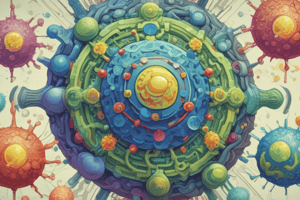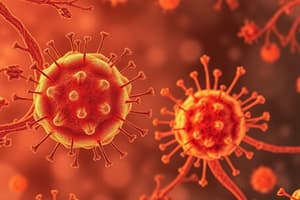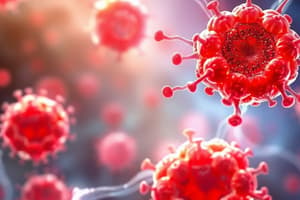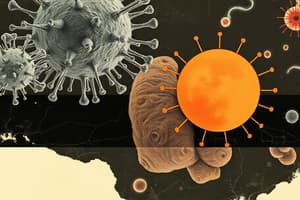Podcast
Questions and Answers
What is the primary characteristic that distinguishes adaptive immunity from innate immunity?
What is the primary characteristic that distinguishes adaptive immunity from innate immunity?
- Activation by antigens
- Ability to generate a memory response (correct)
- Immediate response to pathogens
- Presence of physical barriers
Where do B cells complete their development?
Where do B cells complete their development?
- Lymph nodes
- Thymus
- Spleen
- Red bone marrow (correct)
Which type of adaptive immunity involves cytotoxic T cells directly attacking invading antigens?
Which type of adaptive immunity involves cytotoxic T cells directly attacking invading antigens?
- Cell-mediated immunity (correct)
- Innate immunity
- Humoral immunity
- Antibody-mediated immunity
What is the role of helper T cells in adaptive immunity?
What is the role of helper T cells in adaptive immunity?
How do B cells contribute to antibody-mediated immunity?
How do B cells contribute to antibody-mediated immunity?
What occurs during clonal selection of lymphocytes?
What occurs during clonal selection of lymphocytes?
Which cells are classified as effector cells resulting from clonal selection?
Which cells are classified as effector cells resulting from clonal selection?
What indicates that the immune response is underway in the body?
What indicates that the immune response is underway in the body?
What term refers to the part of an antigen that is recognized by the immune system?
What term refers to the part of an antigen that is recognized by the immune system?
What role does the Major Histocompatibility Complex (MHC) play in the immune system?
What role does the Major Histocompatibility Complex (MHC) play in the immune system?
What characteristic of antigens allows them to provoke an immune response?
What characteristic of antigens allows them to provoke an immune response?
How does a memory cell function in the immune response?
How does a memory cell function in the immune response?
What capability does the human immune system have regarding antigen diversity?
What capability does the human immune system have regarding antigen diversity?
What types of antigens can B cells recognize?
What types of antigens can B cells recognize?
Which of the following cell types is NOT considered an antigen-presenting cell (APC)?
Which of the following cell types is NOT considered an antigen-presenting cell (APC)?
In the process of antigen presentation, what is associated with MHC-II molecules?
In the process of antigen presentation, what is associated with MHC-II molecules?
What is the key second signal required for T cell activation?
What is the key second signal required for T cell activation?
What distinguishes CD8 T cells from CD4 T cells?
What distinguishes CD8 T cells from CD4 T cells?
How do cytotoxic T cells kill infected cells?
How do cytotoxic T cells kill infected cells?
What occurs after antigen-presenting cells (APCs) process antigens?
What occurs after antigen-presenting cells (APCs) process antigens?
What role do memory helper T cells play in the immune response?
What role do memory helper T cells play in the immune response?
Which of the following correctly describes the function of interleukin-2 (IL-2)?
Which of the following correctly describes the function of interleukin-2 (IL-2)?
Which mechanism do cytotoxic T cells utilize to destroy target cells?
Which mechanism do cytotoxic T cells utilize to destroy target cells?
What type of antigens do endogenous antigen-presenting cells (APCs) present?
What type of antigens do endogenous antigen-presenting cells (APCs) present?
What is the primary role of helper T cells in the immune response?
What is the primary role of helper T cells in the immune response?
What happens to activated cytotoxic T cells after they fulfill their role?
What happens to activated cytotoxic T cells after they fulfill their role?
Flashcards
Adaptive immunity
Adaptive immunity
The body's ability to specifically target and destroy invading pathogens, like bacteria, viruses, and parasites.
Antigens
Antigens
Substances recognized as foreign by the immune system, triggering an immune response.
Immunocompetence
Immunocompetence
The process by which T cells and B cells develop the ability to recognize and respond to specific antigens.
Cell-mediated immunity
Cell-mediated immunity
Signup and view all the flashcards
Antibody-mediated immunity
Antibody-mediated immunity
Signup and view all the flashcards
Clonal Selection
Clonal Selection
Signup and view all the flashcards
Clone (in immune system)
Clone (in immune system)
Signup and view all the flashcards
Where does clonal selection occur?
Where does clonal selection occur?
Signup and view all the flashcards
What do effector cells do?
What do effector cells do?
Signup and view all the flashcards
What do memory cells do?
What do memory cells do?
Signup and view all the flashcards
Immunogenicity
Immunogenicity
Signup and view all the flashcards
Reactivity (of an antigen)
Reactivity (of an antigen)
Signup and view all the flashcards
What is an epitope?
What is an epitope?
Signup and view all the flashcards
T cell antigen recognition
T cell antigen recognition
Signup and view all the flashcards
Antigen processing
Antigen processing
Signup and view all the flashcards
Antigen-presenting cell (APC)
Antigen-presenting cell (APC)
Signup and view all the flashcards
Exogenous antigens
Exogenous antigens
Signup and view all the flashcards
Endogenous antigens
Endogenous antigens
Signup and view all the flashcards
MHC-II in exogenous antigen presentation
MHC-II in exogenous antigen presentation
Signup and view all the flashcards
MHC-I in endogenous antigen presentation
MHC-I in endogenous antigen presentation
Signup and view all the flashcards
First signal in T cell activation
First signal in T cell activation
Signup and view all the flashcards
Second signal in T cell activation
Second signal in T cell activation
Signup and view all the flashcards
Helper T cell antigen recognition
Helper T cell antigen recognition
Signup and view all the flashcards
Cytotoxic T cell antigen recognition
Cytotoxic T cell antigen recognition
Signup and view all the flashcards
Clonal selection of T cells
Clonal selection of T cells
Signup and view all the flashcards
Cytokine release by helper T cells
Cytokine release by helper T cells
Signup and view all the flashcards
Cytotoxic T cell killing mechanism
Cytotoxic T cell killing mechanism
Signup and view all the flashcards
Immunological surveillance
Immunological surveillance
Signup and view all the flashcards
Study Notes
Adaptive Immunity Overview
- Adaptive immunity is the body's ability to defend itself against specific invading agents.
- Antigens (Ags) are substances recognized as foreign, triggering an immune response.
- It differs from innate immunity through specificity and memory.
Maturation of T cells and B cells
- B cells mature in red bone marrow.
- T cells develop from pre-T cells that migrate from red bone marrow to the thymus.
- Helper T cells (CD4 T cells) and cytotoxic T cells (CD8 T cells) are crucial parts of the system.
- Immunocompetence is the ability to carry out an adaptive immune response.
- Antigen receptors are proteins embedded in plasma membranes, specifically recognizing antigens.
Types of Adaptive Immunity
- Cell-mediated immunity: Cytotoxic T cells directly attack invading agents, especially intracellular pathogens (like viruses, bacteria, and fungi), some cancer cells, and foreign tissue transplants.
- Antibody-mediated immunity: B cells transform into plasma cells, producing antibodies (Abs) or immunoglobulins. These target extracellular pathogens in body fluids. Helper T cells support both types of immunity.
Clonal Selection
- Lymphocytes proliferate and differentiate in response to a specific antigen, creating a clone of identical cells recognizing the same antigen.
- This process occurs in secondary lymphatic organs/tissues (e.g., lymph nodes, tonsils).
- Swollen lymph nodes/tonsils can indicate clonal selection.
- Effector cells (e.g., active helper T cells, cytotoxic T cells, plasma cells) are responsible for acting against the antigen. They are short-lived.
- Memory cells are long-lived; they participate in the secondary immune response, responding faster to a повторное invasion of the same antigen.
Antigens
- Antigens have two key characteristics: immunogenicity (ability to provoke an immune response) and reactivity (ability to react specifically with antibodies).
- The entire microbe may act as an antigen, but typically smaller parts like epitopes or antigenic determinants evoke the immune response.
- Different epitopes are recognized by the human immune system (a billion or more).
- Major Histocompatibility Complex (MHC) antigens (proteins) are located on the plasma membrane surfaces of most body cells. MHC or human leukocyte antigens (HLA) assist T cells in distinguishing foreign vs. self.
Pathways of Antigen Processing
- B cells recognize and bind to antigens in bodily fluids (lymph, interstitial fluid, blood plasma).
- T cells recognize processed and presented antigen fragments.
- Antigenic proteins are broken down into peptide fragments, associated with MHC molecules, and then presented on plasma membranes.
- The antigen processing pathway depends on whether the antigen is outside or inside body cells.
Antigen Presenting Cells (APCs)
- APCs (e.g., dendritic cells, macrophages, B cells) process and present the antigen.
- APCs are located in tissues or organs where antigens may penetrate, such as skin, respiratory and gastrointestinal tracts, urinary and reproductive tracts, lymph nodes.
- APCs migrate to lymph nodes after processing the antigen.
Exogenous and Endogenous Antigens
- Exogenous antigens are present in fluids outside body cells. Antigen-presenting cells (APCs) process and present these antigens to T cells using MHC-II molecules.
- Endogenous antigens are found inside body cells. Infected cells display these antigens using MHC-I molecules to T cells. After processing, APCs migrate to lymphatic tissues.
Cell-mediated Immunity (Activation of T cells)
- T-cell activation requires two signals: (1) TCR binding to specific antigen fragments presented on antigen-MHC complexes, and (2) costimulation from other molecules.
- Anergy is a state of inactivity that may occur if a T cell encounters an antigen without costimulation.
Activation and Clonal Selection of Helper T Cells
- Most CD4 T cells become helper T cells (CD4 T cells).
- They recognize exogenous antigens combined with MHC-II molecules on APCs.
- Helper T cells secrete cytokines like interleukin-2 (IL-2) that activate other immune cells and help them proliferate.
- Memory helper T cells quickly respond to further encounters.
Activation and Clonal Selection of Cytotoxic T Cells
- Most CD8 T cells become cytotoxic T cells (CD8 T cells).
- They recognize antigens combined with MHC-I molecules.
- They need costimulation.
- The activated cytotoxic T cells destroy infected body cells.
- Memory cytotoxic T cells keep a record for subsequent encounters.
Elimination of Invaders
- Cytotoxic T cells seek out and kill infected target cells.
- Granzymes and perforin/granulysin trigger apoptosis or cytolysis of infected cells.
- This is important in immunological surveillance, preventing tumors and other anomalies.
Studying That Suits You
Use AI to generate personalized quizzes and flashcards to suit your learning preferences.




